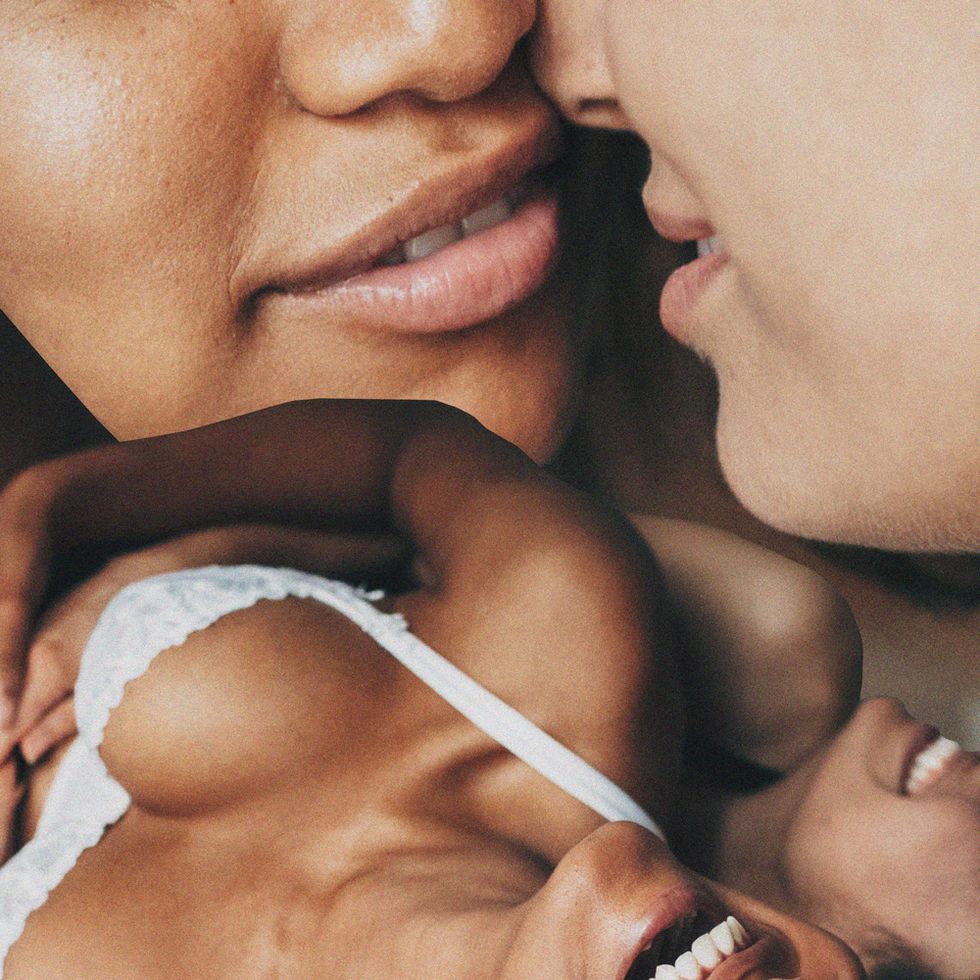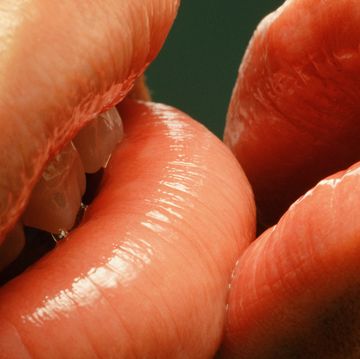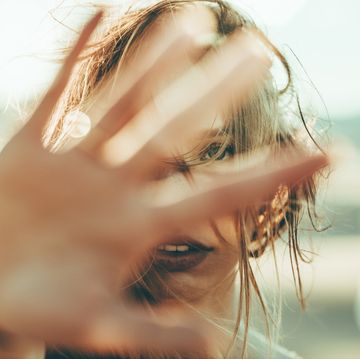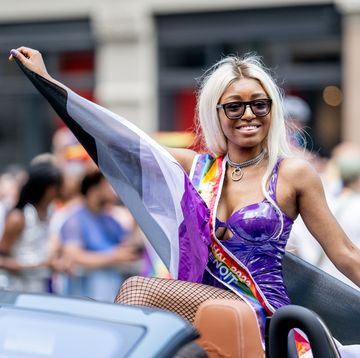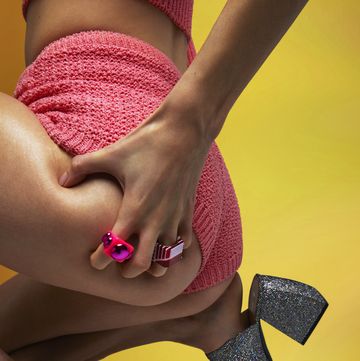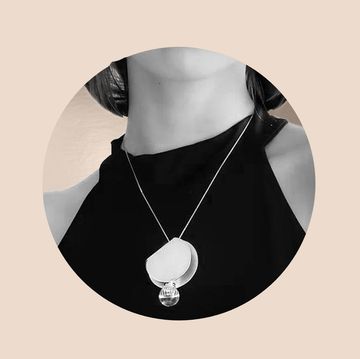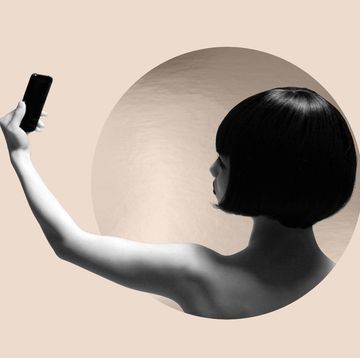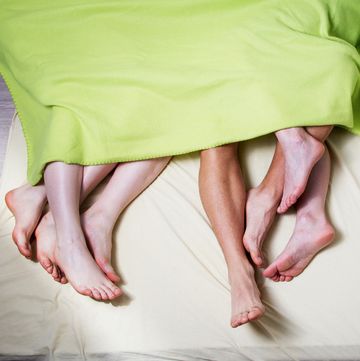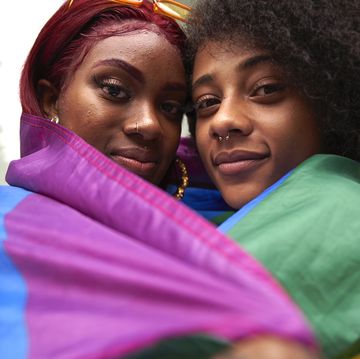Stroking, licking, rubbing, squeezing, smearing, dripping, dousing, sweating…. Not an exhaustive inventory, but the prevailing characteristics of sex. And things that, on any given Sunday, most of us wouldn’t think twice about participating in. But lockdown restrictions and the tenets of social distancing have thrown these activities into sharp relief. After all, you can’t do many of them at a two metre remove.
While we might feel (tentatively) safe to continue our physical relationships with live-in partners, we’ve been convinced that casual encounters could turn us into super-spreaders. Because, if touching faces is ill-advised, then spit-swapping with a stranger must be a Covid transmission guarantee. Clearly that’s what the UK government thinks anyway, considering the much-mocked #SEXBAN that was introduced at the end of March, making it temporarily illegal to bump uglies with people outside of our own households.
But as we transition back out of house arrest and flings and one-night stands once again glisten with temptation, has our approach to them changed? And what of the generation of young children who’ve spent 2020 being taught to fear physical contact, bodily fluids and sharing toys, will they grow up to approach relationships differently?
As sex, in all its many guises, is a fairly ubiquitous priority, ELLE investigates how our experience of intimacy has transformed during lockdown, and whether it’s likely to be different after we re-emerge.
Casual Sex Anxiety
Undoubtedly, we have been given cause to fear sex. If getting within six foot of a stranger in the supermarket is risky, then rubbing your maskless face all over their naked body is probably treacherous. It follows that resuming casual sex practises comes with added concerns about whether a new partner has been exposed to covid-19 and whether or not you’d trust them to tell you if they had.
To an extent, women have always had to worry that men they don’t know might be lying about their (sexual) health to get us into bed. But at least we’ve had sheath methods of contraception to protect ourselves with. Unfortunately, you can’t pop a condom over someone’s breath or germy hands.
‘First-time sex is thrilling,’ says Luisa, 24, from Spain but living in London, ‘and some of the thrill comes from not knowing everything about them and the idea that they might do something to take you by surprise (in a good way). But you don’t ever want the surprise to be a potentially-deadly viral infection, so yes, that makes me nervous.’
Holly, 25, from Bristol explains how she would deal with the apprehension: ‘If went on a date I would definitely judge them if they seemed grubby and they were a bit of a d*ck. If he mentioned all the parties or illegal raves he’d been to I’d be very anxious about how little social distancing he’d done and would panic more about taking it further.’
Others are more cavalier. ‘Frankly, I feel that single people already had it tough trying to meet people before covid,’ says Becky, 25, from Manchester. ‘And now we’re not even allowed to date properly?! I don’t like the idea of smug couples getting all the action, so I think if you get to go to your boyfriend’s house to have sex, then I shouldn’t be unfairly restricted just because I don’t have a boyfriend. It is a risk, but there’s always a chance of contracting something, whether you use a condom or not, so it’s still all just a game of chance.’
We’re all aware of the gamble that post-lockdown sex poses, but whether it’ll make us overwhelmingly cautious or defiant remains to be seen. At any rate, it certainly seems to give women another thing to worry about, in an activity already fraught with risk.
Pornography Reigns
For a while at least, spontaneous hook-ups were off the menu entirely, as we left the house only for our once-daily power walk around the block. Sex starved and desperate for gratification, legions of people turned to pornography. As lockdown began, Pornhub recorded a 2-18% increase in daily streaming, which peaked at +24.4% after they offered a temporary suspension on premium account fees. So far, so predictable. More interestingly, niche sites like XConfessions and LustCinema also recorded a 20-30% increase in viewing hours.
‘It hardly comes as a surprise that porn watching is peaking during lockdown,’ says Madita Oeming, cultural scientist and pornography scholar at the University of Paderborn. ‘If you don’t live with someone you can and want to have sex with, masturbation is the only road to orgasm right now.’ What’s most interesting is that this increase in viewing figures might not just betray the extra hours spent perusing favourite sites by seasoned porn-watchers, but implies too that there are new users dabbling in visual stimuli, perhaps for the first time.
This might be worthy of concern. There has been plenty of research into how consuming conventional porn, from a lot of the mainstream sites, can damage adolescent views about women’s pleasure, what’s expected during sex and, of course, consent. It stands to reason, then, that we might be anxious about more of the population whiling away the hours watching the sort of porn that could create unhealthy approaches towards intimacy. Which is to say nothing of the recent allegations about some of the bigger free sites harbouring videos of trafficked women and child abuse.
On the other hand, the uptake in paid subscriptions to niche (and often female-run) pornography is, in many ways, encouraging.
Erika Lust - indie erotic, sex-positive filmmaker and founder of XConfessions, LustCinema and The Store by Erika Lust – explains: ‘Half of my audience is male, and that trend continued throughout lockdown’s increased viewership. Not all men out there are totally enthusiastic about mainstream pornography or choose it as their only source of sexual inspiration. Not only women, but also men are attracted by porn that promotes gender equality, intimacy, affirmative consent, safety, sexual freedom and exploration.’
Porn is always contentious, but if lockdown has left people tiring of the free sites and pushed them to hunt for more ethical, realistic pornography created by professionals getting fairly paid for well-considered work, it can only be a good thing.
The Next Generation
It might seem inappropriate to pull children into an article about fornicating, but if you consider that so many kids are, at their most impressionable age, suddenly being taught to fear human contact, there are clearly implications for their sexual futures.
As Angela, 41, who teaches at a primary school in North London, explains: ‘Lots of children have reacted differently, it clearly depends on the child. But we do spend so much of our time, outside of lockdown, encouraging primary school age children to share their toys more and to be kinder and friendlier towards other children and to establish good personal connections.
‘And now, we’re suddenly telling them not to share any more or to touch things others have touched, and their desks are suddenly further away from each other and they’re not allowed to run up to their pals in the lunch queue or get close or breathe on each other. I can see how they might become confused. The messaging must feel quite mixed.’
Averil Leimon, clinical psychologist and Director at White Water Group, expands on this: ‘There is no way to say exactly how social distancing will affect children, either short or long term - I am sure there is a legion of psychologists studying it now!
‘But we do know that touch is vital for the human infant to thrive. Famous, now historic, Harlow experiments showed baby monkeys offered either a wire monkey giving milk or a terry towelling one with no milk, would spend minimum time feeding and maximum time clinging to the inanimate but tactile surrogate. Children need to be held and stroked in order to form secure attachments.’
That being said, Leimon clarifies that ‘a good foundation in the very early years gives a child resilience and they are able to cope with and adapt to new situations.’
In other words, children that come from secure, loving homes which practise healthy physical intimacy, are in a better position to endure temporary social distancing measures without too much knock-on effect. Sadly, that means children with less happy home lives and more confusing beginnings are likely to be, once again, at a disadvantage. For them, social distancing measures might compound anxieties they already had about touching and relationships and who knows where that might lead. It certainly follows that it would impact the way they approach sex.
When it comes to sex in a post-lockdown world, the picture we’re developing is uncomfortable. While positives poke through, such as a drive to establish connections beyond the purely physical and patronage of better and more ethical porn, the next phase for our physical relationships is ridden with anxiety. And those who stand to suffer the most are, grievously, the people who always suffer most: young women endeavouring to trust strangers, vulnerable and already susceptible children, victims of revenge porn and, at an even worse extreme, those being exploited or trafficked. What we can all do to tip the balance in a more happy direction, is acknowledge this, be vigilant on the part of those at a disadvantage and offer the good kinds of love, kindness, communication and intimacy more readily than we ever have.
Like this article? Sign up to our newsletter to get more articles like this delivered straight to your inbox.
In need of more inspiration, thoughtful journalism and at-home beauty tips? Subscribe to ELLE's print magazine now and pay just £6 for 6 issues. SUBSCRIBE HERE

Natasha Bird is the Former Executive Editor (Digital) of ELLE.


